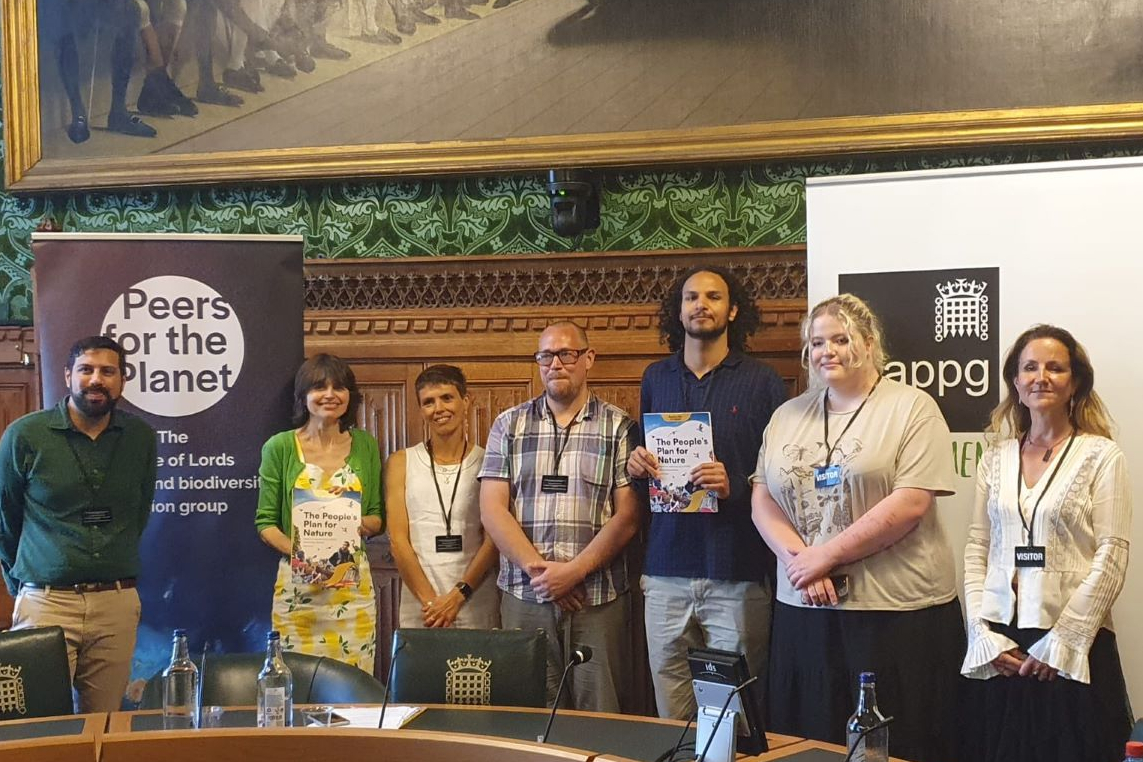Plight of the UK’s Nature taken to Parliament: The People’s Plan for Nature

The People’s Assembly for Nature and NbSI Director, Professor Nathalie Seddon, took to Parliament on Tuesday 13th June. The assembly aimed to chart a path toward a future where the wellbeing of both people and nature remains at the core of decision-making. With Britain facing the alarming status of being one of the most nature-depleted countries globally, immediate action is demanded.
At something of a historic gathering, the People’s Plan for Nature, created by the UK first citizen’s assembly on Nature, was discussed with The All-Party Parliamentary Group on the Environment and Peers for the Planet. Notable figures present included Baroness Kate Parminter, Baroness Young, Charles Courtenay, and MPs Caroline Lucas and Wera Hobhouse
Nat Seddon, Director of NbSI, underscored the need for action, drawing attention to the degradation of nature in the UK. The UK is one of the most nature-depleted countries, ranking in the bottom 10%. Over 41% of species have declined since the 1970s, with 15% facing a higher risk of extinction, including iconic species like the European hedgehog and vital pollinators such as bees and butterflies. These declines have been largely driven by agriculture which has expanded and intensified at the expense of ancient woodlands, heathlands, and wetlands. Meanwhile we continue to pollute our rivers and coastal waters with agricultural runoff, severely compromising the health of aquatic life. Only 5% of UK land is effectively protected for nature. She stressed how the situation is worsened by the effects of climate change; rising temperatures, changes in rainfall patterns, and extreme weather events disrupt ecosystems and have an impact on the distribution and life cycles of species.
But this depletion of nature is not just a problem for the natural world; it has profound implications for society at both local and national levels. Nature provides us with innumerable benefits, including clean air and water, carbon storage to mitigate climate change, erosion and flood control, urban cooling, and economic support. If we neglect nature, we will not be able to achieve our goals of reaching net-zero emissions or meet our commitments under the Convention on Biological Diversity (CBD) or develop in a sustainable manner. Nature is not a luxury; it is essential for our health, prosperity, and overall well-being. The science is clear that it is our life support system. By endangering the biosphere, we are also compromising the quality and stability of life for future generations. We are burdening our children and grandchildren with the responsibility of cleaning up our mess and depriving them of opportunities and a thriving planet. This state of affairs is fundamentally unjust.
Following this poignant opening, six members of the Assembly gave testimonials about their positive experience as an assembly member, as well as sharing their grief and anger over the dire state of nature in the UK. The overarching demand of the People’s Plan is to bring nature central to decision making across all sectors. Key calls to action include:
- Robust Legislation: Stronger laws are needed to safeguard the UK’s critical ecosystems effectively. This includes ensuring greater protection for biodiversity-rich areas and habitats.
- Transparent Food Industry: Greater transparency in the food industry, to empower citizens to make sustainable food choices and support environmentally friendly practices.
- Nature-Based Solutions: Implementing nature-based solutions, both for societal benefits and to address climate change impacts and drivers.
- Permanent Assembly for Nature: Establishment of a such an assembly in the UK to ensure ongoing dialogue and decision-making that places nature at the centre.
“The People’s Plan for Nature reveals that UK nature is not a fringe concern. The citizens have put forth a list of actions for nature that are evidence based and also likely to be widely popular. By embracing these actions, political leaders can provide a clear direction on nature that the wider public can rally behind. Despite the fact that the nature crisis threatens our food, water, air, wealth and wellbeing, it has been largely absent from mainstream political discourse. The Peoples’ Plan for Nature offers a critical and timely opportunity to change that narrative.” – Prof Nat Seddon, Nature-based Solutions Initiative
The People’s Assembly appealed to parliamentarians to follow this event by providing a formal response to the People’s Plan for Nature. They also encouraged further debates in parliament and the promotion of the plan among colleagues.
Parliamentarians showed enthusiasm and engagement in hearing from participants. Cross-party support for the plan’s recommendations is encouraging as it signifies a shared understanding of the importance of protecting nature and the need for collective effort and bipartisan cooperation. This gathering marked a significant step forward in addressing the nature depletion crisis in the UK.
The People’s Plan for Nature represents the voice of the citizens who are passionate about protecting the invaluable natural heritage of the UK.
Add your voice to the plan to help #SaveOurWildIsles by visiting: saveourwildisles.org.uk
The #PeoplesPlanForNature is not an abstract concept; it is a call to action for every concerned citizen. By lending your voice and support to the plan, you can play a pivotal role in safeguarding our beautiful landscapes and diverse wildlife.
Join the movement to #SaveOurWildIsles. Together, we can make a difference.




